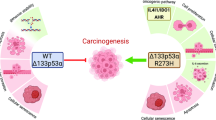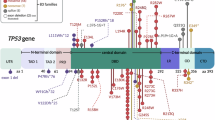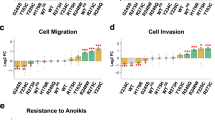Summary
Radiation-induced G1 arrest was studied in four classes of early passage skin fibroblasts comprising 12 normals, 12 heterozygous (mut/wt) TP53 mutation-carriers, two homozygous (mut/–) TP53 mutation-carriers and 16 strains from nine Li-Fraumeni syndrome or Li-Fraumeni-like families in which no TP53 mutation has been found, despite sequencing of all exons, exon–intron boundaries, 3′ and 5′ untranslated regions and promoter regions. In an assay of p53 allelic expression in yeast, cDNAs from these non-mutation strains behaved as wild-type p53. Using two different assays, we found G1 arrest was reduced in heterozygous strains with mis-sense mutations and one truncation mutation, when compared to the range established for the normal cells. Heterozygous strains with mutations at splice sites behaved like normal cells, whilst homozygous (mut/–) strains showed either extremely reduced, or no, arrest. Strains from all nine non-mutation families gave responses within the normal range. Exceptions to the previously reported inverse correlation between G1 arrest and clonogenic radiation resistance were observed, indicating that these phenotypes are not strictly interdependent.
Similar content being viewed by others
Article PDF
Change history
16 November 2011
This paper was modified 12 months after initial publication to switch to Creative Commons licence terms, as noted at publication
References
Barnes, D. M., Hanby, A. M., Gillett, C. E., Mohammed, S., Hodgson, S., Bobrow, L. G., Leigh, I. M., Purkis, T., MacGeoch, C., Spurr, N. K., Bartek, J., Vojtesek, B., Picksley, S. M. & Lane, D. P. (1992). Abnormal expression of wild-type p53 protein in normal cells of a cancer family patient. Lancet 340: 259–263.
Bian, J. & Sun, Y. (1997). p53CP, a putative p53 competing protein that specifically binds to the consensus p53 DNA binding sites: a third member of the p53 family?. Proc Natl Acad Sci USA 94: 14753–14758.
Birch, J. M., Hartley, A. L., Tricker, K. J., Prosser, J., Condie, A., Kelsey, A. M., Harris, M., Morris Jones, P. H., Binchy, A., Crowther, D., Craft, A. W., Eden, O. B., Evans, G. R., Thompson, E., Mann, J. R., Martin, J., Mitchell, E. L. D. & Santibanez-Koref, M. F. (1994). Prevalence and diversity of constitutional mutations in the p53 gene among 21 Li-Fraumeni families. Cancer Res 54: 1298–1304.
Boyle, J. M., Mitchell, E. L., Greaves, M. J., Roberts, S. A., Tricker, K., Burt, E., Varley, J. M., Birch, J. M. & Scott, D. (1998). Chromosome instability is a predominant trait of fibroblasts from Li-Fraumeni families. Br J Cancer 77: 2181–2192.
Davison, T. S., Yin, P., Nie, E., Kay, C. & Arrowsmith, C. H. (1998). Characterisation of the oligomerisation defects of two p53 mutants found in families with Li-Fraumeni and Li-Fraumeni-like syndrome. Oncogene 6: 651–656.
DiLeonardo, A., Linke, S. P., Clarkin, K. & Wahl, G. M. (1994). DNA damage triggers a prolonged p53-dependent G1 arrest and long-term induction of Cip1 in normal human fibroblasts. Genes Dev 8: 2540–2551.
Dulic, V., Kaufmann, W. K., Wilson, S. J., Tlsty, T. D., Lees, E., Harper, J. W., Elledge, S. J. & Reed, S. I. (1994). p53-Dependent inhibition of cyclin-dependent kinase activities in human fibroblasts during radiation-induced G1 arrest. Cell 76: 1013–1023.
Flaman, J-M, Frebourg, T., Morea, V., Charbonnier, F., Martin, C., Chappuis, P., Sappino, A-P, Limacher, J-M, Bron, L., Benhattar, J., Tada, M., Van Meir, E. G., Estreicher, A. & Iggo, R. D. (1995). A simple p53 functional assay for screening cell lines, blood and tumours. Proc Natl Acad Sci USA 92: 3963–3967.
Jost, C. A., Marin, M. C. & Kaelin, W. G. (1997). p73 is a human p53-related protein that can induce apoptosis. Nature 389: 191–194.
Kaghad, Bonnet, H., Yang, Y., Creancier, L., Biscan, J-C, Valent, A., Minty, A., Chalon, P., Lelias, J-M, Dumont, X., Ferrara, P., McKeon, F. & Caput, D. (1997). Monoallelically expressed gene related to p53 at 1p36, a region frequently deleted in neuroblastoma and other human cancers. Cell 90: 809–819.
Kastan, M. B., Onyewere, O., Sidransky, D., Vogelstein, B., Lu, S. & Weinstein, I. B. (1991). Participation of p53 protein in cellular responses to DNA damage. Cancer Res 51: 6304–6311.
Kastan, M. B., Zhan, Q., El-Deiry, W. S., Carrier, F., Jacks, T., Walsh, W. V., Plunkett, B. S., Vogelstein, B. & Fornace, A. J. Jr (1992). A mammalian cell cycle checkpoint pathway utilising p53 and GADD45 is defective in ataxia-telangiectasia. Cell 71: 587–597.
Kuerbitz, S. J., Plunkett, B. S., Walsh, W. V. & Kastan, M. B. (1992). Wild-type p53 is a cell cycle checkpoint determinant following irradiation. Proc Natl Acad Sci USA 89: 7491–7495.
Li, F. P. & Fraumeni, J. F. Jr (1969). Soft tissue sarcomas, breast cancer, and other neoplasms: a familial syndrome?. Ann Intern Med 71: 747–752.
Li, F. P., Fraumeni, J. F., Mulvihill, J. J., Blattner, W. A., Dreyfus, M. G., Tucker, M. A. & Miller, R. W. (1988). A cancer family syndrome in twenty-four kindreds. Cancer Res 48: 5358–5362.
Li, Y-C, Nagasawa, H., Dahlberg, W. K. & Little, J. B. (1995). Diminished capacity for p53 in mediating a radiation-induced G1 arrest in established human tumor cell lines. Oncogene 11: 1885–1892.
Little, J. B. (1968). Delayed induction of DNA synthesis in irradiated human diploid cells. Nature 218: 1064–1065.
Little, J. B. (1970). Irradiation of primary human amnion cell cultures: effects on DNA synthesis and progression through the cell cycle. Radiation Res 44: 674–699.
Little, J. B. & Nagasawa, H. (1985). Effect of confluent holding on potentially lethal damage repair, cell cycle progression, and chromosomal aberrations in human normal and ataxia-telangiectasia fibroblasts. Radiation Res 101: 81–93.
Lomax, M. E., Barnes, D. M., Gilchrist, R., Picksley, S. M., Varley, J. M. & Camplejohn, R. S. (1997). Two functional assays employed to detect an unusual mutation in the oligomerisation domain of p53 in a Li-Fraumeni like family. Oncogene 14: 1869–1874.
Mirzayans, R., Aubin, R. A., Bosnich, W., Blattner, W. A. & Paterson, M. C. (1995). Abnormal pattern of post-γ-ray DNA replication in radioresistant fibroblast strains from affected members of a cancer-prone family with Li-Fraumeni syndrome. Br J Cancer 71: 1221–1230.
Nagasawa, H., Latt, S. A., Lalande, M. E. & Little, J. B. (1985). Effects of X-irradiation on cell cycle progression, induction of chromosomal aberrations and cell killing in ataxia telangiectasia (AT) fibroblasts. Mutation Res 148: 71–82.
Oren, M. (1997). Lonely no more: p53 finds its kin in a tumour suppressor haven. Cell 90: 829–832.
Schmale, H. & Bamberger, C. (1997). A novel protein with strong homology to the tumor suppressor p53. Oncogene 15: 1363–1367.
Tainsky, M. A., Bischoff, F. Z. & Strong, L. C. (1995). Genomic instability due to germline p53 mutations drives preneoplastic progression toward cancer in human cells. Cancer Metastasis Rev 14: 43–48.
Varley, J. M., Chapman, P., McGown, G., Thorncroft, M., White, G. R. M., Greaves, M. J., Scott, D., Speadborough, A., Tricker, K. J., Birch, J. M., Evans, D. G. R., Reddel, R., Camplejohn, R. S., Burn, J. & Boyle, J. M. (1998). Genetic and functional studies of a germline TP53 splicing mutation in a Li-Fraumeni family. Oncogene 16: 3291–3298.
Varley, J. M., McGown, G., Thorncroft, M., Santibanez-Koref, M. F., Kelsey, A. M., Tricker, K. J., Evans, D. G. R. & Birch, J. M. (1997). Germline mutations of TP53 in Li-Fraumeni families: an extended study of 39 families. Cancer Res 57: 3245–3252.
Westphal, C. H., Schmaltz, C., Rowan, S., Elson, A., Fisher, D. A. & Leder, P. (1997). Genetic interactions between atm and p53 influence cellular proliferation and irradiation-induced cell cycle checkpoints. Cancer Res 57: 1664–1667.
Williams, K. J., Boyle, J. M., Birch, J. M., Norton, J. D. & Scott, D. (1997). Cell cycle arrest defect in Li-Fraumeni syndrome: a mechanism of cancer predisposition? Oncogene 14: 277–282.
Author information
Authors and Affiliations
Rights and permissions
From twelve months after its original publication, this work is licensed under the Creative Commons Attribution-NonCommercial-Share Alike 3.0 Unported License. To view a copy of this license, visit http://creativecommons.org/licenses/by-nc-sa/3.0/
About this article
Cite this article
Boyle, J., Greaves, M., Camplejohn, R. et al. Radiation-induced G1 arrest is not defective in fibroblasts from Li-Fraumeni families without TP53 mutations. Br J Cancer 79, 1657–1664 (1999). https://doi.org/10.1038/sj.bjc.6690265
Received:
Revised:
Accepted:
Published:
Issue date:
DOI: https://doi.org/10.1038/sj.bjc.6690265



